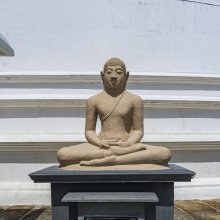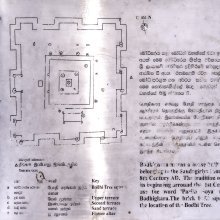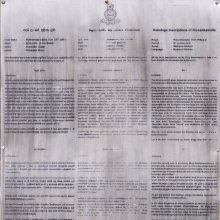Karava: 12 definitions
Introduction:
Karava means something in Buddhism, Pali, Hinduism, Sanskrit, Marathi, Jainism, Prakrit, Tamil. If you want to know the exact meaning, history, etymology or English translation of this term then check out the descriptions on this page. Add your comment or reference to a book if you want to contribute to this summary article.
Images (photo gallery)
In Hinduism
Purana and Itihasa (epic history)
Source: Cologne Digital Sanskrit Dictionaries: The Purana IndexKarava (करव).—A chief of the Vānaras.*
- * Brahmāṇḍa-purāṇa III. 7. 234.

The Purana (पुराण, purāṇas) refers to Sanskrit literature preserving ancient India’s vast cultural history, including historical legends, religious ceremonies, various arts and sciences. The eighteen mahapuranas total over 400,000 shlokas (metrical couplets) and date to at least several centuries BCE.
In Buddhism
Mahayana (major branch of Buddhism)
Source: archive.org: Bulletin of the French School of the Far East (volume 5)Karava (करव) [?] (in Chinese: Kia-lo-p'o) is the name of an ancient kingdom associated with Mūla (or Mūlanakṣatra) and Pūrvāṣāḍhā (or Pūrvāṣāḍhānakṣatra), as mentioned in chapter 18 of the Candragarbha: the 55th section of the Mahāsaṃnipāta-sūtra, a large compilation of Sūtras (texts) in Mahāyāna Buddhism partly available in Sanskrit, Tibetan and Chinese.—Chapter 18 deals with geographical astrology and, in conversation with Brahmarāja and others, Buddha explains how he entrusts the Nakṣatras [e.g., Mūla and Pūrvāṣāḍhā] with a group of kingdoms [e.g., Karava] for the sake of protection and prosperity.

Mahayana (महायान, mahāyāna) is a major branch of Buddhism focusing on the path of a Bodhisattva (spiritual aspirants/ enlightened beings). Extant literature is vast and primarely composed in the Sanskrit language. There are many sūtras of which some of the earliest are the various Prajñāpāramitā sūtras.
Languages of India and abroad
Marathi-English dictionary
Source: DDSA: The Molesworth Marathi and English Dictionarykaravā (करवा).—m A morsel of sugarcane as prepared for the mouth. Applied with the verb paḍaṇēṃ to a limb or part considered as broken off. Ex. hātā- cā ka0 or kambarēcā ka0 paḍalā. 2 A hollow notched as a channel for the reception of a rope. 3 (Better kāravā) A description of dance. 5 A flaw upon a pearl,--a line roundabout its middle.
--- OR ---
kārava (कारव).—f A tree: also the stem or a shoot of it. The tree is long and slender, and is much used in palings and fencework.
--- OR ---
kāravā (कारवा).—m ( H from Palanquin bearer.) A disguise, or the person assuming it, or the dancing of such a character. The disguise is that of a male in female garb with turban and sword, or that of a female in male attire. v dē, nāca, nācava.
Source: DDSA: The Aryabhusan school dictionary, Marathi-Englishkaravā (करवा).—m A morsel of sugarcane. A flaw upon a pearl.
--- OR ---
kārava (कारव) [-vīṃ, -वीं].—f A tree. The stem of it.
Marathi is an Indo-European language having over 70 million native speakers people in (predominantly) Maharashtra India. Marathi, like many other Indo-Aryan languages, evolved from early forms of Prakrit, which itself is a subset of Sanskrit, one of the most ancient languages of the world.
Sanskrit dictionary
Source: DDSA: The practical Sanskrit-English dictionaryKārava (कारव).—A crow.
Derivable forms: kāravaḥ (कारवः).
Source: Cologne Digital Sanskrit Dictionaries: Shabda-Sagara Sanskrit-English DictionaryKārava (कारव).—m.
(-vaḥ) A crow. E. kā an imitative sound, rava who sounds. f. (-vī) 1. A kind of Anise, (Anethum sowa.) 2. Another plant, (Celosia cristata.) 3. The asafœtida plant or its leaf, Hinguparni. 4. A kind of fennel, (Nigella Indica.) 4. A small gourd. E. ka water, āṅ before ru to go, aṇ and ṅīp affs.
Source: Cologne Digital Sanskrit Dictionaries: Monier-Williams Sanskrit-English Dictionary1) Kārava (कारव):—[=kā-rava] m. ‘making the sound kā’, a crow, [cf. Lexicographers, esp. such as amarasiṃha, halāyudha, hemacandra, etc.]
2) [v.s. ...] Name of a man, [Saṃskārakaustubha]
Source: Cologne Digital Sanskrit Dictionaries: Yates Sanskrit-English DictionaryKārava (कारव):—(vaḥ) 1. m. A crow. f. (vī) A kind of anise; a gourd.
[Sanskrit to German]
Sanskrit, also spelled संस्कृतम् (saṃskṛtam), is an ancient language of India commonly seen as the grandmother of the Indo-European language family (even English!). Closely allied with Prakrit and Pali, Sanskrit is more exhaustive in both grammar and terms and has the most extensive collection of literature in the world, greatly surpassing its sister-languages Greek and Latin.
Prakrit-English dictionary
Source: DDSA: Paia-sadda-mahannavo; a comprehensive Prakrit Hindi dictionary1) Karava (करव) in the Prakrit language is related to the Sanskrit word: Karaka.
2) Kārava (कारव) also relates to the Sanskrit word: Kāra.
Prakrit is an ancient language closely associated with both Pali and Sanskrit. Jain literature is often composed in this language or sub-dialects, such as the Agamas and their commentaries which are written in Ardhamagadhi and Maharashtri Prakrit. The earliest extant texts can be dated to as early as the 4th century BCE although core portions might be older.
Kannada-English dictionary
Source: Alar: Kannada-English corpusKaṟava (ಕಱವ):—[noun] an old gold coin(now obs.).
Kannada is a Dravidian language (as opposed to the Indo-European language family) mainly spoken in the southwestern region of India.
See also (Relevant definitions)
Starts with (+50): Karavada, Karavadanem, Karavadi, Karavadige, Karavaeru, Karavahi, Karavahiya, Karavai, Karavaikkalam, Karavaiyan, Karavakam, Karaval, Karavala, Karavalagiri, Karavalam, Karavalambana, Karavalambanastotra, Karavalaputri, Karavalaya, Karavali.
Ends with: Akarakarava, Akarava, Anakarava, Barikarava, Bhekarava, Ghamtikarava, Jaratkarava, Kakarava, Karkarava, Kekarava, Krenkarava, Kuhakarava, Lokarava, Mahakarkarava, Muntakkankarava, Nikarava, Pushkarava.
Full-text (+2): Karavam, Karavas, Kaharava, Keharava, Kerava, Kakalirava, Karavasa, Karavi, Karavatira, Kantharava, Kara, Karaka, Purudama, Karu, Kakkai, Turayana, Purvashadha, Mula, Airavata, Vanta.
Relevant text
Search found 9 books and stories containing Karava, Ka-rava, Kā-rava, Karavā, Kārava, Kāravā, Kaṟava; (plurals include: Karavas, ravas, Karavās, Kāravas, Kāravās, Kaṟavas). You can also click to the full overview containing English textual excerpts. Below are direct links for the most relevant articles:
Rig Veda (translation and commentary) (by H. H. Wilson)
Manusmriti with the Commentary of Medhatithi (by Ganganatha Jha)
Verse 8.360 < [Section XLVI - Adultery]
Verse 10.120 < [Section XIV - Sources of Income (vittāgama)]
The Religion and Philosophy of Tevaram (Thevaram) (by M. A. Dorai Rangaswamy)
Chapter 4.6 - (b) Symbology of Man (the deer) < [Volume 2 - Nampi Arurar and Mythology]
The World of ‘Vrata Kathas’ < [April – June, 2006]
A Glimpse into Sinhalese Poetry < [May, 1928]
Kautilya Arthashastra (by R. Shamasastry)
Chapter 12 - Concerning Deposits < [Book 3 - Concerning Law]


